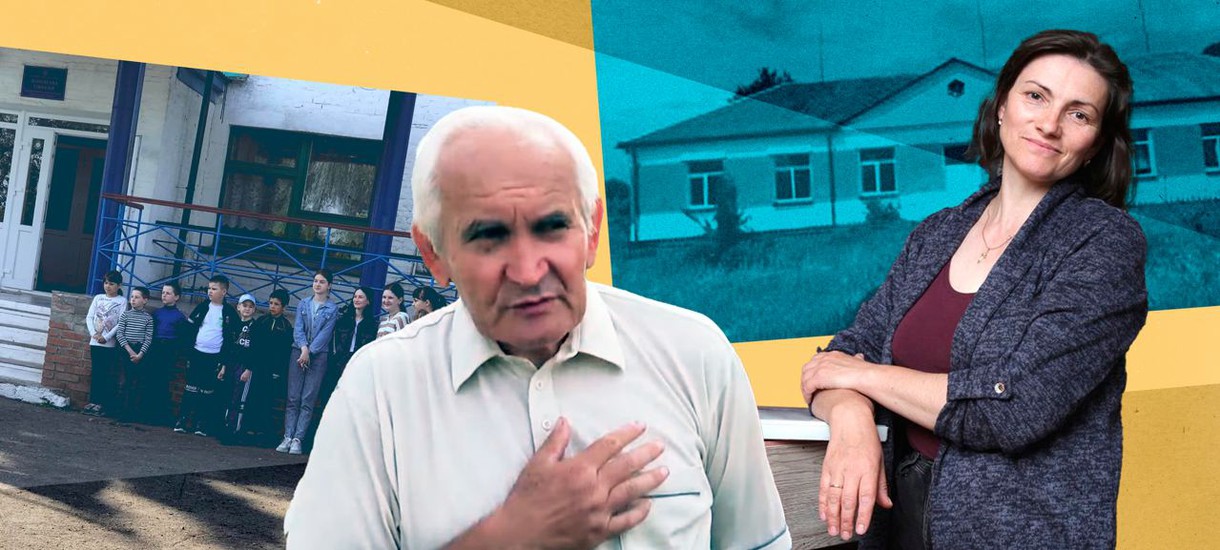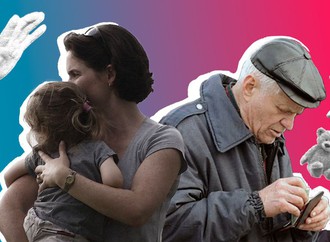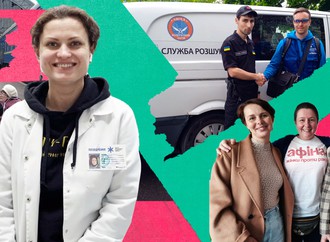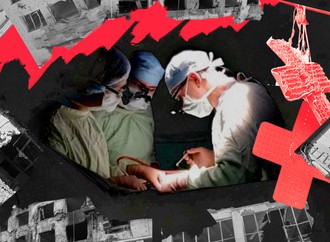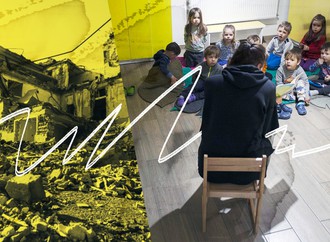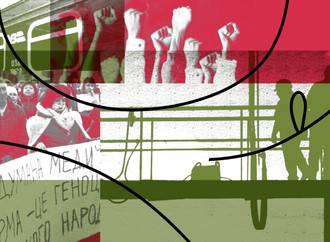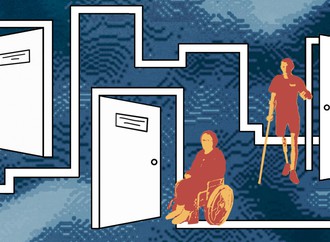Reforms in education, healthcare, as well as the decentralization reform, have caused serious changes in the social sector, since the closure and “optimization” of a significant number of schools and hospitals was meant to be a part of these reforms, especially in rural areas. However, such unpopular changes can be successfully stopped when the community gets involved. the Due to the nature of these transformations
In this article, we will describe the cases when concerned citizens managed to stand their ground and defend their interests by combining their efforts. In the Volyn and Poltava regions, the local inhabitants managed to save their local schools from being closed. Likewise, in a miner’s town in the Lviv region, the healthcare workers defended a local hospital from a similar fate, while their colleagues from the Chernihiv region are making their first steps towards a similar goal. You will also learn how the inhabitants of a mountain village, driven to despair, have stopped ecological recklessness from which they had suffered from for many years. All these people have tried to defend their rights by different means. While some were sending inquiries to state institutions and attending sessions there on a regular basis, others defended their interests in court or by protesting.
Preventing a school funding cut
At the beginning of 2022, the inhabitants of the Rokytnytsia village, located in the Kolodyazhenska territorial community of the Volyn oblast, found out that their gymnasium is due to be “optimized” and demoted to a primary school. In this case the students would have to commute to another village that is ten kilometers away, which in turn would put further strain on the children. Apart from that, the parents did not understand why the gymnasium had to be demoted to a school, considering that 2 mln UAH were invested into its renovation by the regional authorities a few years ago. Also, there was no lack of students, given that 68 people were studying there, which was enough for the gymnasium to not be considered to be undercrowded. But perhaps the largest motivating factor was that the closure of the gymnasium would be seen by many of the inhabitants as another step towards the decline of their village. Earlier, a village club (house of culture in post-soviet countries), which was one of the best looking in the region was closed in Rokytnytsia and its abandoned two storey building is now falling apart. A dairy farm and a few buildings of a former kolhosp (collective farm) are also abandoned. The people did not want the gymnasium to end up the same way.
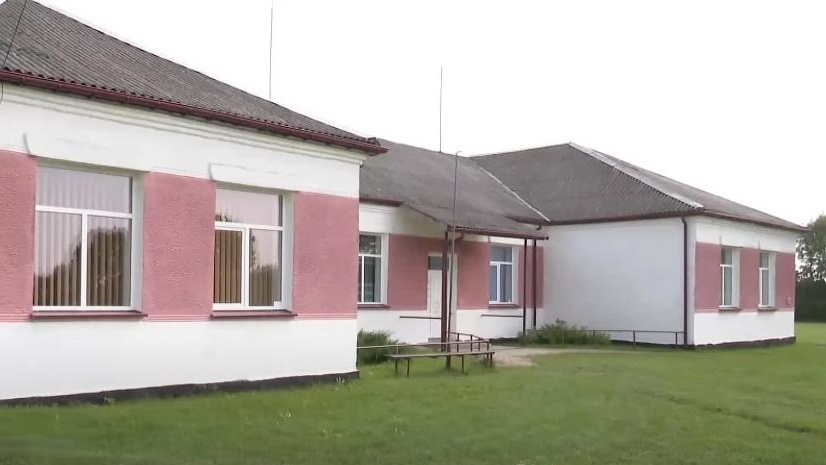
Gymnasium in the Rokytnytsia village. Photo: Kovel medya
One of the initiators of the push to save the gymnasium is a former principal and a teacher Mykola Chul, who dedicated 51 years of his life to working at the gymnasium. According to him, at first the inhabitants did not have much hope of somehow influencing the decision of the local authorities. The people had to be convinced that it is possible to save the gymnasium and that saving money at the expense of the gymnasium is not a solution. In his conversations with local inhabitants, Mykola emphasized that the school was recently renovated and that its infrastructure is in a good state.
“I had to go door-to-door, write announcements on a bus stop with a call to gather and discuss how the gymnasium can be saved. I encouraged to attend the village council sessions and to spread the information about the situation regarding the gymnasium to each representative.” – Mykola Chul
Gradually, the villages began more actively taking part and bringing awareness to the problem of the gymnasium closure. The inhabitants contacted the local TV and media outlets, gathered signatures for the preservation of the gymnasium three times, met with each of the local representatives and attended the sessions multiple times. One of such attendances became crucial. The inhabitants of Rokytnytsia, Alyona Korzh, told Spilne about how one day the inhabitants found out at almost the last minute that a vote on the gymnasium closure was about to be held on that day.
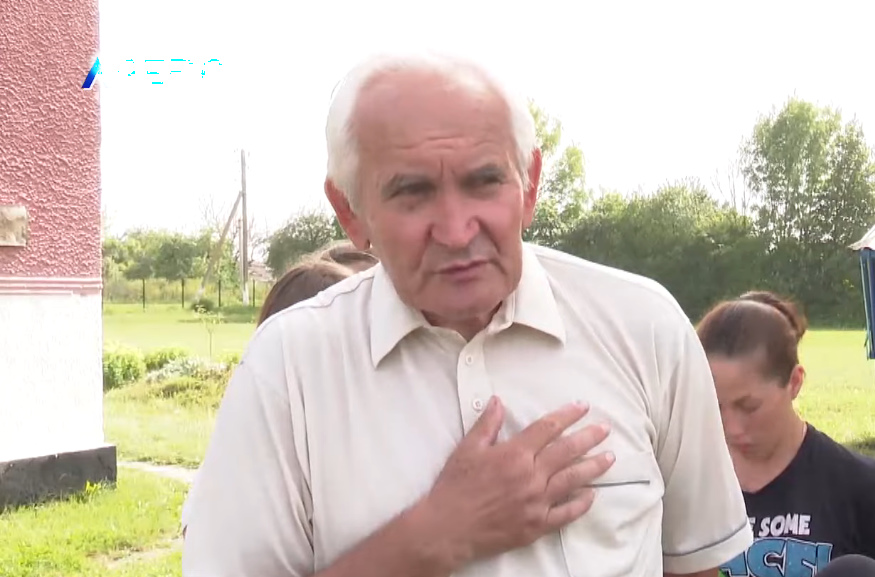
Mykola Chul. Screenshot: Avers
“The parents learned about this accidentally, 10 minutes before the beginning of the session. Immediately, a few dozen inhabitants gathered and drove to Kolodyazhne using their own cars. At first, we weren’t even given a chance to speak, but eventually they caved in.” – Alyona Korzh
However, the story of the gymnasium is not over yet, since the question of its closure and optimization was postponed by two years and it will be addressed again in the coming month. So the inhabitants should be ready to again protect their gymnasium.
Sheltering families with many children to save a school
In the Tsipky village, located in the Poltava oblast, the local community managed to save a school from closure. At the time, only 21 students attended the school and in the fall of 2016, the local administration decided to close it as undercrowded. However, under the pressure of an initiative group of mothers the local government made a deal: if in three months (by the 1st of january, 2017) there will be over 25 students attending the school, it will not be closed. Neither the government officials, nor the local inhabitants, except for the parents’ committee, did not believe that the situation could be improved. But, by the time the deadline came, there were already 46 students attending the school.
The example of Tsipky is unique in the sense that its inhabitants became one of the first in Ukraine to use a “demographic boom” in order to save the school. According to Yevheniya Filina, the head of the initiative group to save the school, she, together with a few other parents, decided to invite families with many children to the village. The newly arrived families were promised free housing and help with employment at a local kindergarten, school, on a local farm, etc. The financial help for this program was provided by the village council, by the initiative of Vadym Bilyak. For each newly arrived child, the village council provided the family with 5000 UAH. The money was not handed out to the parents directly, but instead used to buy a building which cost approximately 25-30 thousand UAH. Therefore, families with five-six children did not have to pay anything to buy a house.
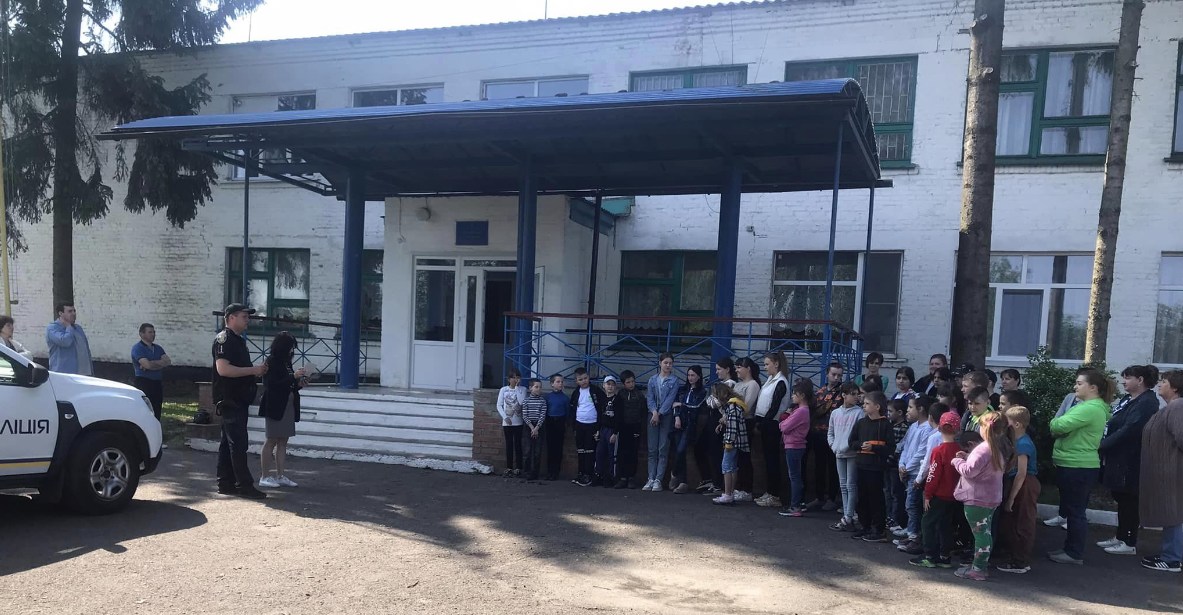
School in the Tsipky village, Poltava oblast
At first the proactive local inhabitants tried to find such families using social media, but eventually contacted one of the central TV stations. After the release of a TV segment about the initiative, members of the initiative group started receiving a lot of calls.
“Almost immediately we were contacted by a mother of seven children from Melitopol. We met the family and housed them the next day. Later, another family with five children arrived. Since they arrived in the evening, we housed them at the school gym, where we placed mattresses and blankets, and also turned on the heating in the school. On the next day we took the family to their new house.” – Yevheniya Filina
When the rest of the inhabitants of Tsipky noticed that the demographic situation in the village was improving and that there was a chance to save the school, they started actively helping the cause. People brought clothes, furniture and food for their new neighbors and continued to support them even after many months. Eventually, the school was not closed – today, the Tsipky school, which became a gymnasium, has over 50 students. Yevheniya Filina said that while it was enough to bring only one or two families with many children in order to save the school, the parents decided to act in advance so that the government would not even consider closing the school ever again.
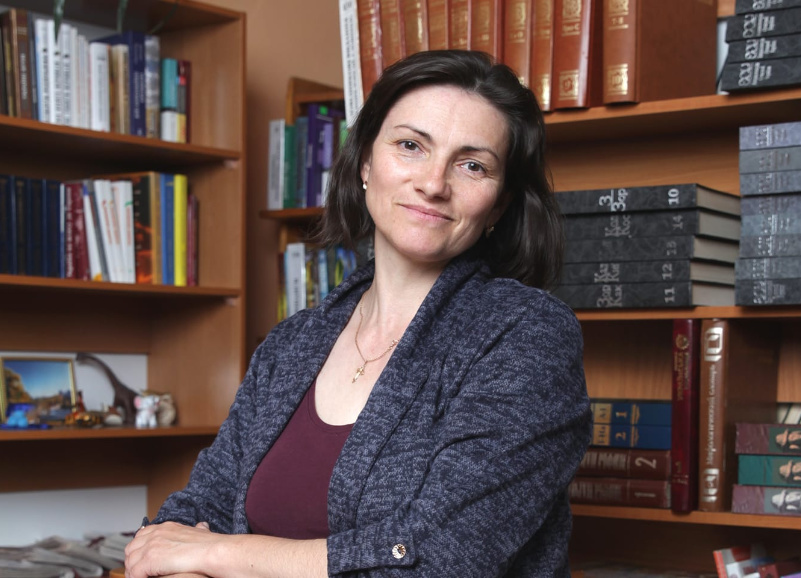
Yevheniya Filina. Photo: Facebook
Saving the hospitals via court battles
Another acute problem across different regions is the closure of hospitals and feldsher-midwife stations, which complicates timely access to healthcare. Suspile already has an article about how doctors, nurses and paramedics take action in order to preserve their healthcare institutions. One such case happened in the miner’s town Sosnivka in Lviv oblast. In 2019, the administration closed multiple departments of a medical institution and fired dozens of healthcare workers, whose salary payments were also delayed on top of being fired. Part of the healthcare workers decided to defend their rights. The workers held protests, created a union and took their complaints to court. After many months of struggle, where the healthcare workers were also joined by local inhabitants who understood that their local hospital was at stake, the court ordered for the healthcare workers to be reinstated. They were also fully compensated for their delayed salary, and the hospital itself was not closed.
Similar situation is currently unfolding in the Chernihiv oblast, the difference being that the healthcare workers are for now on the first stage of their struggle. These are the healthcare workers of the communal non-profit enterprise “Center for primary medical and sanitary care” in the city of Pryluky. According to the healthcare workers, this communal non-profit enterprise is currently on the edge of being shut down, the staff is underpaid and many staff members were even fired. Refusing to put up with such recklessness, the healthcare workers created a union, with part of the staff becoming members. The union workers went to Pryluky municipal court, which in February ordered for the first of the six fired workers to be reinstated, a nurse. Also the court ordered for the nurse’s salary to be paid in full, which according to the Decree #28 of the Cabinet of Ministers of Ukraine should be 13.5 thousand UAH per month for nurses. Nevertheless, this is only the first step in a difficult battle for labour rights.
According to Svitlana Sydorenko, the head of the Independent union of healthcare workers and manager of a feldsher station in Radkiv, “Center for primary medical and sanitary care”, which was profitable until recently, is currently in decline. In her opinion, the regional administration is not interested in the further functioning of the healthcare institution, which currently operates as a primary care. From over 60 staff members in the institution, only 12 are left, and only two of them are doctors. Despite this, no attempts are made to fill the vacant positions. Neither is this healthcare institution being merged with another or undergoing reorganization.
“We asked to be merged with a regional hospital, on whose territory we are located. It would be convenient for a patient that arrives from a village to get a referral for a medical test and to get tested at the same place, or to be hospitalized there with a referral from the general practitioner. Also it is possible to reogranize our healthcare institution into a rehabilitation center. There are so many veterans who will return with psychological or health issues, and they all will need help! But all our offers are met with rejections.” – Svitlana Sydorenko
The leader of a civic movement for protection of healthcare workers “Be like Nina”, Oksana Slobodyana, says that in the healthcare system there are often cases when a hospital, a medical center or feldsher-midwife station are gradually defunded in order to shut them down later. She believes that a similar process could also happen in case of the communal non-profit enterprise “Center for primary medical and sanitary care”.
“If there is no funding, then there is no equipment, education opportunities and changes. Then the healthcare institution becomes uninteresting for the patients. This does not happen immediately, it happens gradually. In this case, the society loses attentiveness towards the medical institution. Because no one wants to improve their health at a place where the services are of low quality.” – Oksana Slobodyana
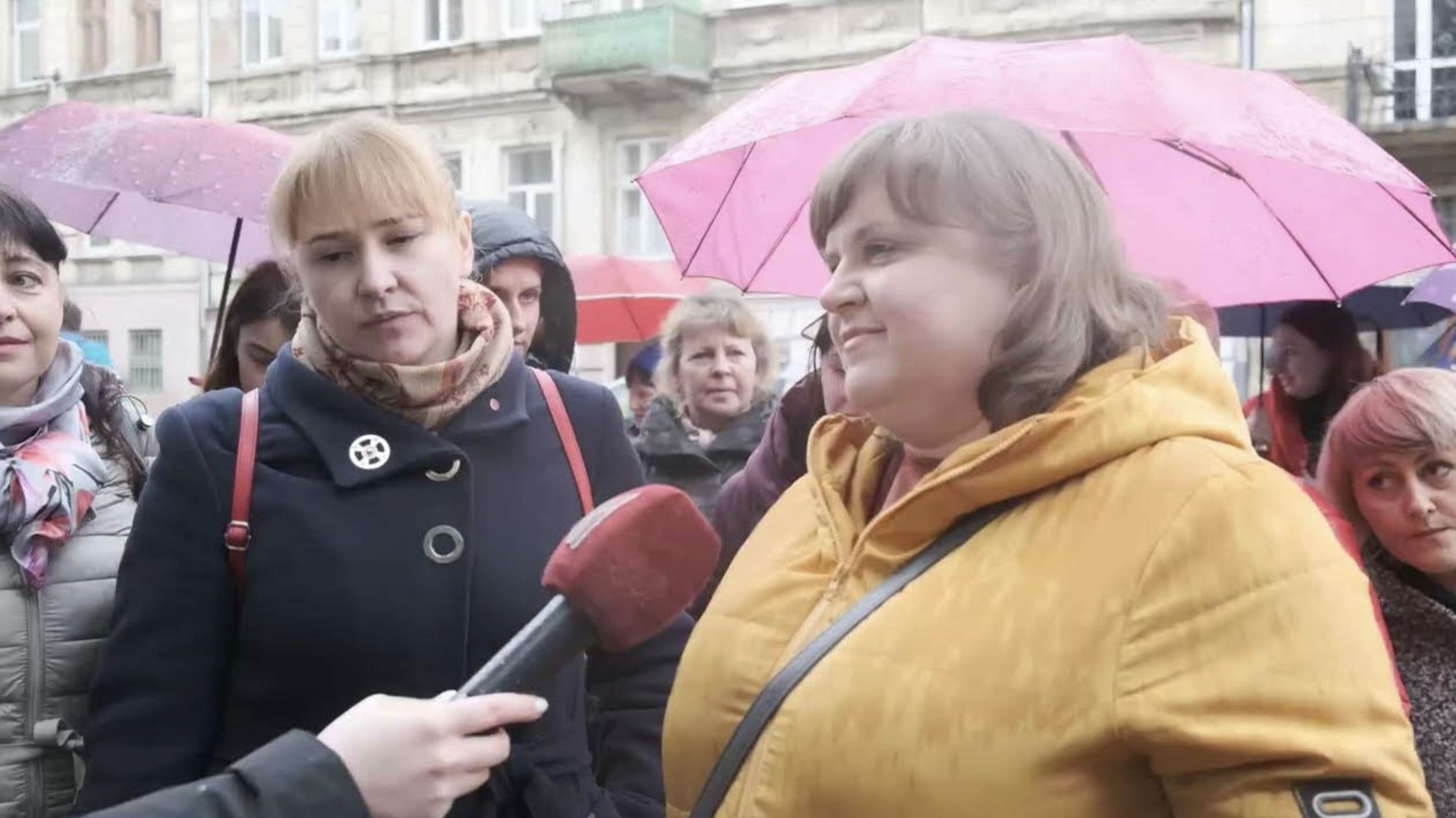
Oksana Slobodyana (on the right). Screenshot: YouTube video «Профспілка медсестер "Львівського ТМО 3" вимагає визнання»
Standing as a “human shield”
The story of a mountain village Berezhnytsia in the Ivano-Frankivsk oblast is interesting, since the local inhabitants, after being disappointed by the lack of support from the local government, turned to direct action. They blocked the entrance for garbage trucks to a landfill, which for many years was poisoning their lives.
At the beginning of the 1980ies, a polygon for solid waste was formed near the village, where garbage from the entire region was dumped. Currently this is a landfill with the highest altitude in Ukraine. Each day, eight to ten trucks dumped waste a hundred meters away from the closest inhabited buildings on the bank of the Berezhnytsia river, which is a tributary to the Cheremosh river. During the years of the polygon’s existence, it grew by 1.5 hectares and to a few meters in height. Despite this it was not enclosed by a dam, so the infiltrate freely penetrated into the ground and surface waters. The local inhabitants complained about the worsening state of the environment and the smell, which spread across the village. They addressed the government on multiple occasions with a demand to solve the ecological problem: to legalize the landfill in order to close it or to create a sorting line on it. However, as Mykhailo Zelenchuk, a local inhabitant of Berezhnytsia told Spilne, all requests were met with excuses.
“We were constantly told that it is impossible to stop the dumping of waste on the polygon, since there is no alternative, meaning there is no other place where the waste can be dumbed.” – Mykhailo Zelenchuk
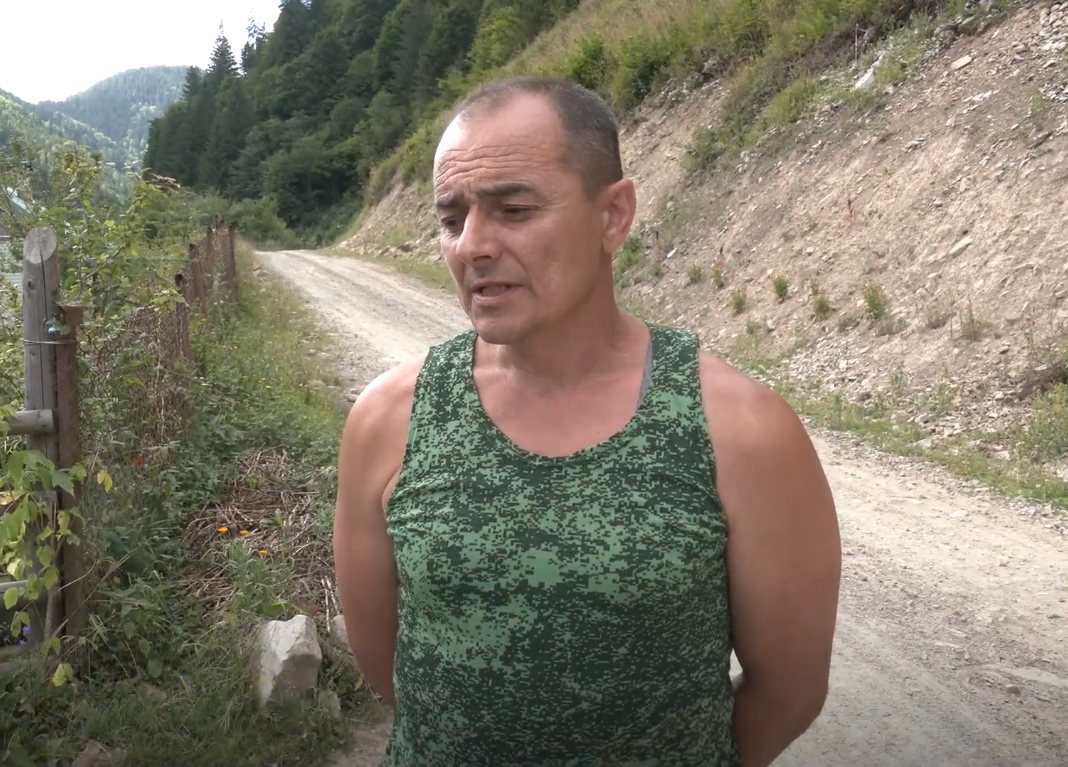
Mykhailo Zelenchuk. Screenshot: Suspilne
However, a ten year struggle eventually gave its results. The local government at last legalized the polygon and even determined the deadline by which the landfill would go out of operation – June 2018, which was, however, planned to be extended. However, as soon as the deadline arrived, the villagers blocked the entrance to the polygon, not letting the waste trucks pass. They guarded the entrance day and night for three months. According to Mykhailo, they were also assisted by the inhabitants of the neighboring village Kryvopillya.
“People replaced one another. Some stood there day and night, some for multiple days.”
In the end, according to the decision made at the session of the village council, the polygon was officially closed. Eventually, there were attempts of recultivation made there, which were, however, halted due to lack of funding. Currently the landfill is overgrown with grass, but no new waste is dumped there, since the entrance is closed and surveillance cameras were installed in order to track those who dump waste illegally. All the waste from the region is now dumped 130 kilometers away, near Ivano-Frankivsk, where there is a sorting line of the polygon.
Permissiveness breeds abuse
Governmental institutions and businesses often disregard social interests. But Oksana Slobodyana believes that when people openly voice their discontent, write appeals to the relevant institutions, government bodies and representatives – they usually get their way.
“When the public does not show any activity, they can get away with anything, because permissiveness breeds abuse. Today there are communities that do not allow for decisions that do not satisfy the majority of people to be made. But, unfortunately, there are few of them.” – Oksana Slobodyana
Oksana Slobodyana is convinced that nowadays, citizens should take an active interest in the decisions of the local government and support those inhabitants that constantly take part in public life.
“If you can do something to support, at least a public statement, that is already a step. Also citizens should not forget about the power of unions. In Ukraine, the legislation regarding the creation of trade unions and public organizations is quite loyal to the citizen.”
It is important to mention that during martial law, civil activity in Ukraine has some restrictions. The protests are banned, access to some registers and public information may be restricted. The activities of representative commissions and local councils may not be announced beforehand, some practice a closed format.
Despite this, the socio-political situation in Ukraine requires people to participate more actively in public life. Because apart from reforms in education, healthcare and social protection, there are also negative changes in the labour legislation, as well as lack of transparency in the decision making process of the governmental institutions on all levels. All this, eventually, forces the citizens to defend their interests: both on the individual level, as well as by uniting.
